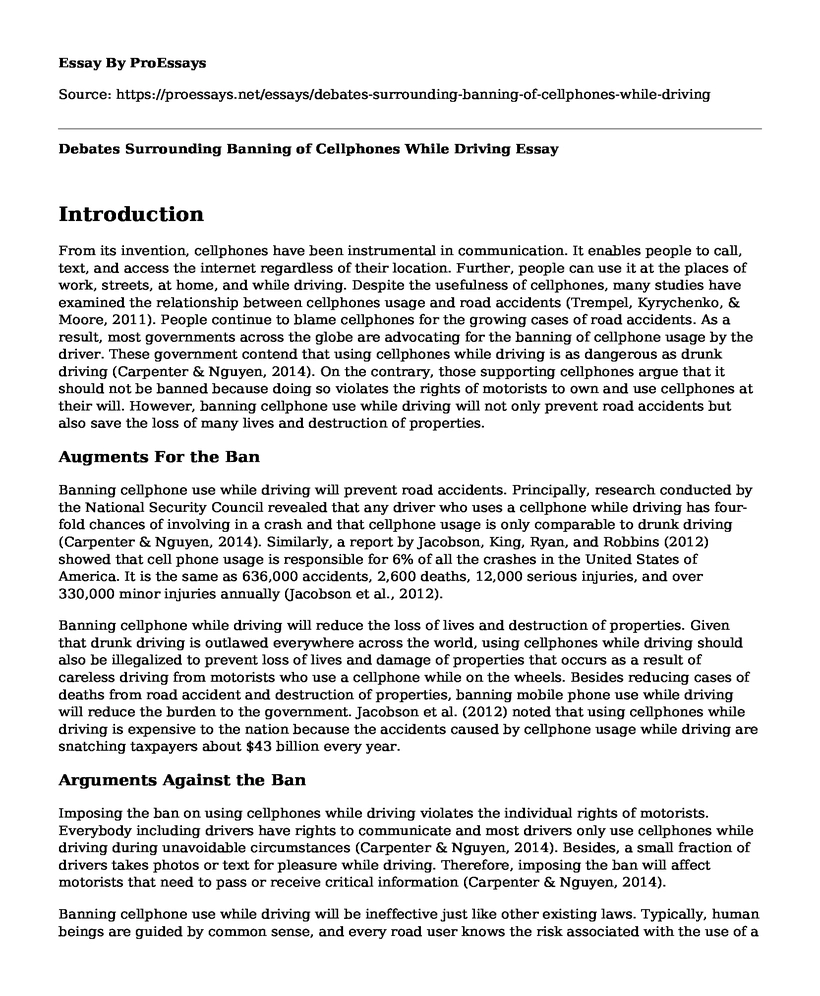Introduction
From its invention, cellphones have been instrumental in communication. It enables people to call, text, and access the internet regardless of their location. Further, people can use it at the places of work, streets, at home, and while driving. Despite the usefulness of cellphones, many studies have examined the relationship between cellphones usage and road accidents (Trempel, Kyrychenko, & Moore, 2011). People continue to blame cellphones for the growing cases of road accidents. As a result, most governments across the globe are advocating for the banning of cellphone usage by the driver. These government contend that using cellphones while driving is as dangerous as drunk driving (Carpenter & Nguyen, 2014). On the contrary, those supporting cellphones argue that it should not be banned because doing so violates the rights of motorists to own and use cellphones at their will. However, banning cellphone use while driving will not only prevent road accidents but also save the loss of many lives and destruction of properties.
Augments For the Ban
Banning cellphone use while driving will prevent road accidents. Principally, research conducted by the National Security Council revealed that any driver who uses a cellphone while driving has four-fold chances of involving in a crash and that cellphone usage is only comparable to drunk driving (Carpenter & Nguyen, 2014). Similarly, a report by Jacobson, King, Ryan, and Robbins (2012) showed that cell phone usage is responsible for 6% of all the crashes in the United States of America. It is the same as 636,000 accidents, 2,600 deaths, 12,000 serious injuries, and over 330,000 minor injuries annually (Jacobson et al., 2012).
Banning cellphone while driving will reduce the loss of lives and destruction of properties. Given that drunk driving is outlawed everywhere across the world, using cellphones while driving should also be illegalized to prevent loss of lives and damage of properties that occurs as a result of careless driving from motorists who use a cellphone while on the wheels. Besides reducing cases of deaths from road accident and destruction of properties, banning mobile phone use while driving will reduce the burden to the government. Jacobson et al. (2012) noted that using cellphones while driving is expensive to the nation because the accidents caused by cellphone usage while driving are snatching taxpayers about $43 billion every year.
Arguments Against the Ban
Imposing the ban on using cellphones while driving violates the individual rights of motorists. Everybody including drivers have rights to communicate and most drivers only use cellphones while driving during unavoidable circumstances (Carpenter & Nguyen, 2014). Besides, a small fraction of drivers takes photos or text for pleasure while driving. Therefore, imposing the ban will affect motorists that need to pass or receive critical information (Carpenter & Nguyen, 2014).
Banning cellphone use while driving will be ineffective just like other existing laws. Typically, human beings are guided by common sense, and every road user knows the risk associated with the use of a cellphone when driving. As such, it is upon every driver to know when to use and avoid using a mobile phone. Moreover, despite having laws prohibiting drunk driving and marijuana smoking, people still drive while intoxicated and smoke marijuana (Trempel et al., 2011). Therefore, the most important thing is to comply with the law and not the act itself.
Conclusion
It is evident that cellphones are among the most reliable and flexible ways of passing information. However, using them while driving has been associated with an increased risk of accidents. Supporters of the ban have stated that imposing the ban will reduce accidents, prevent loss of lives and destruction of properties that occur as a result of using cellphones while driving. They have also argued that cellphone use while driving is a burden to taxpayers. However, those opposed to the ban have asserted that it will violate individual rights and do little to reduce road accidents. They have also stated that many laws that were enacted to either prevent drunk driving or using marijuana have been ineffective and therefore imposing a ban on cellphone use while driving will also fail. Despite these divergent views, using cell phones while driving should be banned because it will prevent road accidents and save many lives and properties. Undoubtedly, anything worth saving lives and properties is worth undertaking.
References
Carpenter, C. S., & Nguyen, H. V. (2014). Effects of a driver cellphone ban on overall, handheld, and hands-free cellphone use while driving: New evidence from Canada. Health Economics, 24(11), 1452-1467. doi:10.1002/hec.3098
Jacobson, S. H., King, D. M., Ryan, K. C., & Robbins, M. J. (2012). Assessing the long term benefit of banning the use of hand-held wireless devices while driving. Transportation Research Part A: Policy and Practice, 46(10), 1586-1593. doi:10.1016/j.tra.2012.08.007
Trempel, R. E., Kyrychenko, S. Y., & Moore, M. J. (2011). Does banning hand-held cell phone use while driving reduces collisions? CHANCE, 24(3), 6-11. doi:10.1080/09332480.2011.10739869
Cite this page
Debates Surrounding Banning of Cellphones While Driving. (2022, Feb 28). Retrieved from https://proessays.net/essays/debates-surrounding-banning-of-cellphones-while-driving
If you are the original author of this essay and no longer wish to have it published on the ProEssays website, please click below to request its removal:
- The Brains Response to Drugs
- Paper Example on Social Issues Facing America Today
- Research Paper on Terrorism in America in Today's Society
- Essay Sample on Drugs: Legality, Definition, Examples & Impact on Body
- Essay Example on Gender Roles in Religion: Women in Leadership?
- Essay Example on Women's Health: A Growing Concern Worldwide
- Paper Example on Alcohol Use Disorder: Identifying Risk with AUDIT & T-ACE







